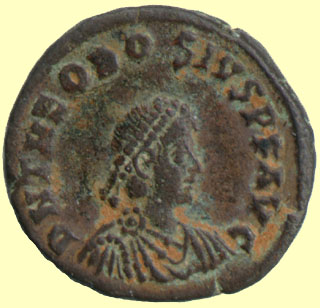 Contents -
Previous Article -
Next Article
Contents -
Previous Article -
Next Article
Theodosius was asked to take on an almost impossible task and fill Valens' shoes as Emperor in the East after one of the greatest disasters to befall the Romans in almost 600 years. The emperor Valens had been killed and his army destroyed at Adrianople in August, 378 A. D. The East was left defenseless. Valens' nephew, the young Emperor Gratian, selected Theodosius because of his family's solid military background. Apparently, Theodosius was willing to forgive the fact that his father had been disgraced and murdered as a result of a court intrigue a few years before during the reign of Gratian's father, Valentinian I. So Theodosius came out of retirement at his Spanish villa to serve the Eastern Roman Empire with his strong leadership skills.
No sooner was Theodosius on the throne than he had to deal with three major crises. First, his Persian neighbors to the East might try to take advantage of the weakened Roman defenses. Persia had been an on again, off again enemy and rival of Rome for more than four hundred years. Theodosius' young nephew Gratian was not very well liked by his subjects, and especially disliked by the high ranking military officers in charge of the western legions. And, if there things were not enough, something had to be done about Fritigern and the horde of Visigothic raiders who had annihilated Valens' army.
These were indeed strange times. Theodosius was a ruthless general, yet a very pious and religious man. He was also a very capable emperor, ruling with absolute authority except where his authority came into conflict with the Catholic Church. A bizarre incident during his reign illustrates how rulers of the day exercised absolute power over the people they ruled yet would obey the commands of a powerful bishop.
The citizens of the Greek city of Thessalonika had rioted and murdered one of the emperor's officers. Theodosius responded by sending a detachment of troops to slaughter anyone they thought had anything to do with the murder, and they wound up killing many innocent people besides. When Archbishop Ambrose of Milan heard about the deed, he threatened to excommunicate the emperor. Theodosius had no choice but to beg forgiveness and do penance for his deed. After Theodosius had suitably humbled himself, waiting outside Ambrose's palace in the snow, he was duly forgiven. An earlier incident involving riots and threatened insurrection in the city of Alexandria did not incur the wrath of the archbishop, and was ruthlessly put down by Theodosius’ soldiers
Perhaps the most famous and important event that occurred during the reign of Theodosius I was the Battle of the River Frigidus. In A.D. 392. Arbogastes, Valentinian II's Frankish Master of Soldiers on the throne in the West after Valentinian II was either murdered or committed suicide. Arbogastes simply wanted to rule, but it would not be acceptable for a Frank to sit upon the imperial throne. So he chose Eugenius, a Neo-Pagan supported by a group of powerful Roman senators to sit on the throne and do Arbogastes' bidding. The emperor was married to the sister of the dead Valentinian, and she kept pleading with Theodosius to avenge her poor slain brother. When Theodosius came from the East with an army to attack Eugenius and Arbogastes, they found the passes of the Julian Alps heavily fortified. By the best conventional military thinking of the day, no army entering Italy from the East (as Theodosius did) stood even a slim chance of defeating a well positioned army defending these high mountain passes. The battle took place during two days in early September, A. D. 394. On the evening of the first day of the battle, it appeared that Theodosius was in retreat and disarray. Detachments of Eugenius' army moved into positions to surround and entrap the Theodosian troops. However, Theodosius' agents worked hard throughout the night to turn the loyalty of Eugenius' troops. By morning, the enemy detachments that had trapped Theodosius were pledging their loyalty to him. With the help of a violent storm that blew dust in the face of Eugenius' soldiers and snatched shields and weapons out of their hands, Theodosius and his Visigothic federated troops totally routed the army of Eugenius. Eugenius was captured after the battle and executed and Arbogastes fled into the mountains and is believed to have killed himself a few days later.
The outcome of this battle held great religious significance for the Catholic Church. Paganism had made its final, desperate stand and had been totally vanquished. Eugenius had represented the interests of such Pagan senatorial families in Rome such as the Symmachi and others. With Eugenius and Arbogastes dead, there would never be another serious threat to Church power from pagan interests. Another strange twist of history is associated with the Battle of the Frigidus. Theodosius had established a military academy for top generals in which a young Visigoth named Alaric had taken his training and had done quite well. Alaric's first major action was to take a heavily defended valley at the Battle of the Frigidus. In A. D. 394, the fearsome Goth who would later sack Rome herself was sacrificing the lives of his troops to defend the Roman Empire against a rebel and usurper. A short fifteen years later, one of Rome's finest generals would be one of her most dreaded enemies.
Go to next article on Honorius
Go back to previous article on Eugenius